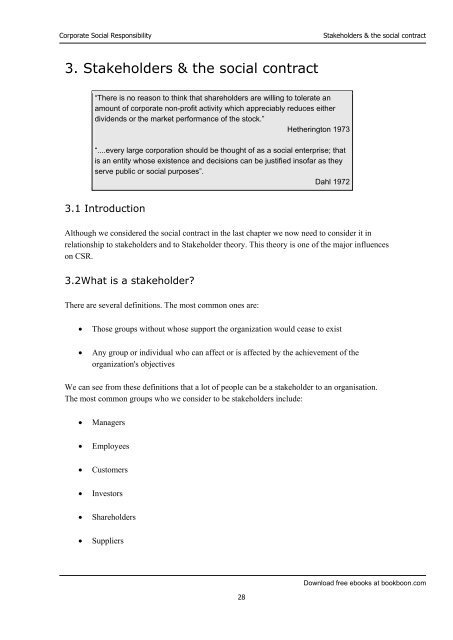Defining Corporate Social Responsibility - Tutorsindia
Defining Corporate Social Responsibility - Tutorsindia
Defining Corporate Social Responsibility - Tutorsindia
You also want an ePaper? Increase the reach of your titles
YUMPU automatically turns print PDFs into web optimized ePapers that Google loves.
<strong>Corporate</strong> <strong>Social</strong> <strong>Responsibility</strong><br />
Stakeholders & the social contract<br />
3. Stakeholders & the social contract<br />
“There is no reason to think that shareholders are willing to tolerate an<br />
amount of corporate non-profit activity which appreciably reduces either<br />
dividends or the market performance of the stock.”<br />
Hetherington 1973<br />
“....every large corporation should be thought of as a social enterprise; that<br />
is an entity whose existence and decisions can be justified insofar as they<br />
serve public or social purposes”.<br />
Dahl 1972<br />
3.1 Introduction<br />
Although we considered the social contract in the last chapter we now need to consider it in<br />
relationship to stakeholders and to Stakeholder theory. This theory is one of the major influences<br />
on CSR.<br />
3.2What is a stakeholder?<br />
There are several definitions. The most common ones are:<br />
<br />
<br />
Those groups without whose support the organization would cease to exist<br />
Any group or individual who can affect or is affected by the achievement of the<br />
organization's objectives<br />
We can see from these definitions that a lot of people can be a stakeholder to an organisation.<br />
The most common groups who we consider to be stakeholders include:<br />
<br />
<br />
<br />
<br />
<br />
<br />
Managers<br />
Employees<br />
Customers<br />
Investors<br />
Shareholders<br />
Suppliers<br />
Download free ebooks at bookboon.com<br />
28
















